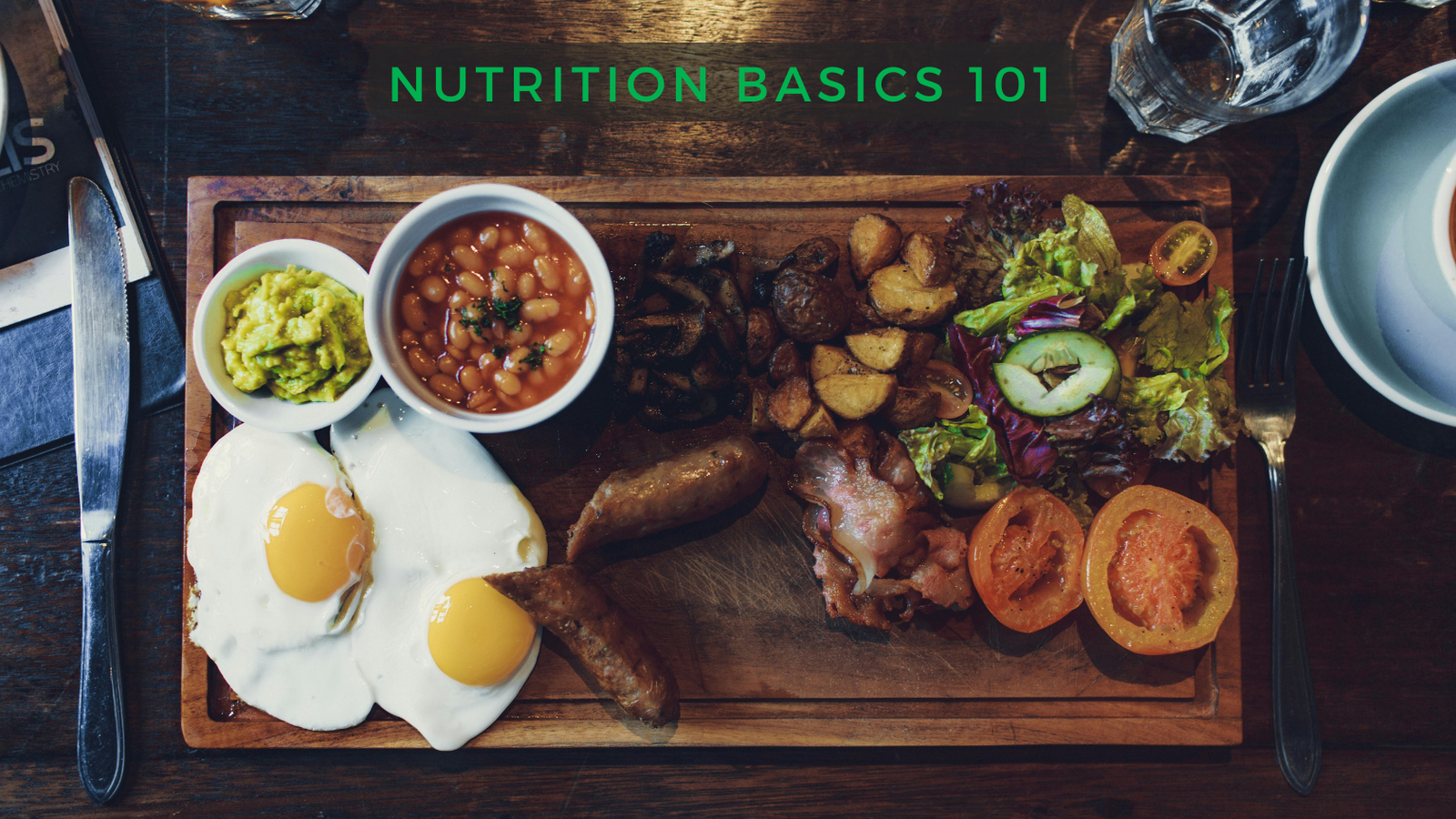Let’s get down to the nutrition basics. There are thousands of different ideas about food, diets, and eating. Everyone knows that a balanced diet is crucial for achieving optimal health and wellness. The problem is that many people are trying to find the easy solution instead of actually learning what to eat. If you don’t learn exactly how and what to eat you will find yourself moving from fad to fad and diet to diet wondering why you can’t gain or keep the weight off.
I have spoken to countless people about this and its always the same thing. “I want to lose weight, so I am only going to eat 800 calories”, then they find themselves fatigued and weak throughout the day barely functioning. “I am going to eat salad all day”, then they find themselves binge eating in the evening. “I can’t eat sweets because I don’t want to gain weight”, then after a 2 week sweet fast they eat an entire box of ice cream sandwiches after work in the parking lot before getting home. There has to be a better, more holistic way to achieve a healthy weight and lifestyle at the same time.
With small changes you will find yourself feeling like you never have before. Focus on the importance of traditional, nutrient-dense foods, sustainable farming practices, and the avoidance of modern processed foods. This will bring about nutritious food intake and you will know exactly what is going into your body. And guess what? Food can actually taste good. This guide will help you understand the basics of building a nutrient rich food regiment that aligns with these principles, ensuring you receive the vital nutrients your body needs while achieving or maintaining weight goals.
Table of Contents
The Nutrition Basics
Nutrient-Dense Whole Foods
- Whole, Unprocessed Foods: Focus on consuming foods in their most natural state. This includes fresh fruits and vegetables, whole grains, raw dairy, pastured meats, and wild-caught seafood. These foods have natural occurring enzymes that help the processing and digestion of critical nutrients the body needs to function at its maximum capacity.
- Avoid Processed Foods: Minimize or eliminate processed and refined foods, including sugar, white flour, and industrial oils. It seems extreme but these foods cause inflammation in the body and contribute to a lot of health issues many adults are facing today. If you cant eliminate them completely, at least reduce the intake and most importantly familiarize yourself with the information presented and you will feel and see the benefits of sticking to the nutrition basics.

Quality Animal Products
- Grass-Fed and Pastured Meats: Choose meats from animals that are grass-fed and raised on pasture, as they are higher in essential nutrients like omega-3 fatty acids, vitamins, and minerals. Just because meat is injected with hormones does not mean those are the hormones you want in your food and getting processed in your body. Be wise about what you are putting in your body and do your own research.
- Wild-Caught Seafood: Choose wild-caught fish and seafood, which are richer in beneficial omega-3 fats and free from harmful additives.
- Raw Dairy Products: Select raw, unpasteurized dairy products from grass-fed animals, which retain beneficial enzymes and nutrients. Most people are intolerant to Dairy and most of the dairy products in the market do not contain the necessary enzymes to assist the body in breaking down the fats and proteins from dairy. This leads to dairy sensitivities and in the long run will lead to more harmful digestive issues like leaky gut, irritable bowel syndrome, and many more.
Traditional Fats
- Healthy Fats: Include traditional fats such as butter, ghee, lard, tallow, and coconut oil. These fats are stable for cooking and provide essential fatty acids. You must understand which fats to cook with and how, otherwise, you have the potential of cooking the fats in the incorrect manner leading to unnecessary toxicity. Fats cooked incorrectly can become toxic to the body and overtime contribute to inflammation and digestive issues.
- Avoid Industrial Oils: Avoid polyunsaturated vegetable oils like soybean, corn, and canola oil, which are highly processed and can cause inflammation. Use the proper oils in the correct manner as outlined in the nutrition basics and other posts in this series to ensure correct usage of cooking oils.
Fermented Foods
- Probiotic-Rich Foods: Incorporate fermented foods like sauerkraut, kimchi, kefir, yogurt, and fermented vegetables into your diet. These foods support gut health by providing beneficial bacteria. Bacteria is critical to the breakdown of food in the body. Ensure that you are eating these foods to enhance the absorption of nutrients and minerals into the body.

Proper Preparation of Grains, Legumes, and Nuts
- Soaking and Fermentation: Soak, sprout, or ferment grains, legumes, and nuts to neutralize anti-nutrients and enhance nutrient absorption.
Bone Broths and Organ Meats
- Bone Broth: Make bone broth from animal bones to extract valuable minerals and collagen, which support joint and gut health. This is extremely important for those with leaky gut or already sensitive stomachs. Bone broth contains essential cell repairing ingredients and has been shown to play an active role in repairing the cellular walls of the digestive tract.
- Organ Meats: Include nutrient-dense organ meats like liver, heart, and kidneys, which are rich in vitamins and minerals. This may be a no-go for many, however, there are many benefits to eating nutrient dense meats which have been eaten for years. Remember, if this is a “hard no”, there is always supplements which will be covered in this series.
Building a Balanced Diet
Emphasize Fresh, Seasonal Produce
- Variety of Vegetables: Aim for a variety of colorful vegetables, focusing on leafy greens, cruciferous vegetables, and root vegetables. These provide essential vitamins, minerals, and antioxidants.
- Seasonal Fruits: Choose fruits that are in season and grown locally, as they are fresher and more nutrient-dense. Although the cheapest option in the grocery store, foreign fruits and vegetables may be grown using unethical farming practices. Local farmers markets and local grown fruits and vegetables in the grocery stores are the best option.
Include Quality Proteins
- Animal Proteins: Incorporate pastured meats, wild-caught seafood, and raw dairy into your diet. These proteins are rich in essential amino acids and nutrients.
- Plant Proteins: For plant based protein, include soaked and fermented legumes, nuts, and seeds as protein sources.

Healthy Fats and Oils
- Cooking Fats: Use traditional fats like butter, ghee, and coconut oil for cooking. These fats are stable at high temperatures and add flavor to your meals.
- Cold-Pressed Oils: Use cold-pressed olive oil and avocado oil for dressings and low-heat cooking.
Whole Grains and Legumes
- Proper Preparation: Soak, sprout, or ferment grains and legumes before cooking to improve their digestibility and nutrient availability.
- Variety: Include a variety of whole grains like quinoa, brown rice, and oats, and legumes like lentils, chickpeas, and black beans.
Fermented Foods
- Daily Intake: Incorporate a small serving of fermented foods twice a day to support digestion and overall gut health. Fermented drinks are also a great alternative to fermented foods.
Hydration
- Water: Drink plenty of water throughout the day to stay hydrated. Dehydration can lead to headaches, fatigue, and other symptoms that can be easily avoided by drinking the proper amount of water daily.
- Herbal Teas: Include herbal teas and homemade broths as additional sources of hydration and nutrients. If you do not drink tea, there are also various hydration supplements that do not contain additives or stimulants and assist with hydrating the body.

Sample Meal Plan
Breakfast:
- Scrambled eggs cooked in butter with sauteed green onions, spinach and pumpkin seeds.
- A slice of sprouted Ezekiel bread.
- A glass of raw milk, kefir, or water.
Lunch:
- Roasted chicken drums or thigh with a side of sprouted grains mixed greens, avocado, and fermented carrots.
- A serving of bone broth.
Dinner:
- Pan seared steak with roasted root vegetables.
- A serving of sprouted grains
- A small serving of fermented foods.
Snacks:
- Fresh seasonal fruit.
- A handful of soaked and dehydrated nuts.
- Yogurt with a drizzle of honey.

Conclusion
Do me a favor and take an honest assessment of how you are eating and how you are feeling. If you are feeling great and have this area under control than more power to you. If not, please consider listening to the information here and start making the necessary changes to improve your eating habits and finally start seeing the results you desire. Stop moving from fad to fad trying to find the perfect diet and stick to the nutrition basics. Learn to eat well with great tasting whole foods that don’t take much time to prepare and are filled with all of the necessary nutrients your body needs to function optimally.
By emphasizing quality, sustainably sourced foods and incorporating traditional dietary practices, you can achieve optimal health and well-being. Start incorporating these principles into your daily meals and experience the benefits of a truly balanced diet.



